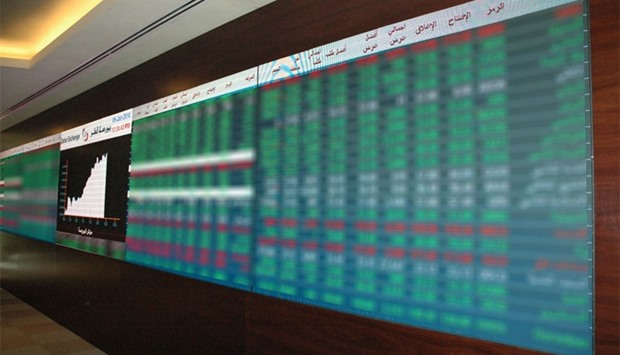The Qatar Stock Exchange on Monday lost a sizeable more than 140 points in its key index and about QR12bn in capitalisation, mainly owing to strong selling at the industrials and banking counters.
Increased selling pressure from local retail investors led the 20-stock Qatar Index to fall 1.33% to 10,302.41 points, reflecting the weak global oil prices.
"A dip below 10,580 points would trigger additional weaknesses to 10,200 points and may be lower to 10,000 points," a Kamco technical analysis said, suggesting that medium-term and long-term investors can stay in the market as long as the index is closing above 10,000 points and 9,500 points, respectively.
Gulf individuals’ bearish outlook also had its role in dampening the market, whose sensitive index is up mere 0.03% year-to-date.
“The market appears to be a difficult spot since the beginning of this year,” an industry source said, highlighting that the previous year had seen a good run.
Market capitalisation eroded 1.91% to QR589.25bn mainly owing to large and small cap segments.
Islamic equities were seen declining slower than the main index in the market, where local non-Qatari institutions turned bullish.
Trade turnover and volumes were on the increase in the bourse, where the industrial, real estate and banking sectors together accounted for about 78% of the total volume.
The Total Return Index shed 0.86% to 18,238.87 points, the All Share Index by 0.75% to 3,143.64 points and the Al Rayan Islamic Index (Price) by 0.51% to 2,440.69 points.
The industrials index plummeted 1.41%, followed by banks and financial services (1.38%), insurance (0.91%), transport (0.45%) and telecom (0.24%); whereas realty and consumer goods gained 1.03% and 0.79% respectively.
More than 67% of the traded stocks were in the red with major losers being Industries Qatar, QNB, Ahlibank Qatar, Islamic Holding Group, Qatari Investors Group, Qatar Islamic Insurance, Mazaya Qatar, Milaha and Vodafone Qatar; even as Zad Holding, Woqod, Qatari German Company for Medical Devices, Ezdan and United Development Company were among the prime gainers.
Local individuals’ net profit-booking grew substantially to QR27.86mn compared to QR5.04mn the previous day.
Gulf individual investors turned net sellers to the tune of QR2.82mn against net buyers of QR0.42mn on Sunday.
Gulf institutions’ net buying declined noticeably to QR1.71mn compared to QR2.9mn on February 10.
Non-Qatari individuals’ net buying weakened marginally to QR0.22mn against QR0.87mn the previous day.
However, domestic institutions’ net buying strengthened impressively to QR15.79mn compared to QR3.29mn on Sunday.
Non-Qatari institutions turned net buyers to the extent of QR12.96mn against net sellers of QR2.42mn on February 10.
Total trade volume rose 7% to 5.91mn shares, value by 90% to QR201.18mn and transactions by 34% to 4,939.
The consumer goods sector’s trade volume more than tripled to 0.38mn equities and value more than quadrupled to QR30.06mn on 24% increase in deals to 214.
The telecom sector reported a 68% surge in trade volume to 0.67mn stocks, 54% in value to QR8.57mn and 42% in transactions to 318.
The transport sector’s trade volume soared 46% to 0.19mn shares, value by 53% to QR5.45mn and deals by 18% to 141.
The banks and financial services sector saw a 45% increase in trade volume to 1.19mn equities and value more than doubled to QR78.52mn on almost-doubled transactions to 1,206.
The insurance sector’s trade volume shot up 40% to 0.07mn stocks, value by 81% to QR8.13mn and deals by 83% to 86.
The real estate sector’s trade volume was up 3% to 1.48mn shares, value by 8% to QR27.06mn and transactions by 11% to 987.
However, there was an 8% fall in the industrials sector’s trade volume to 1.92mn equities but on a 45% jump in value to QR48.4mn and 24% in deals to 1,987.
In the debt market, there was no trading of treasury bills and sovereign bonds.


